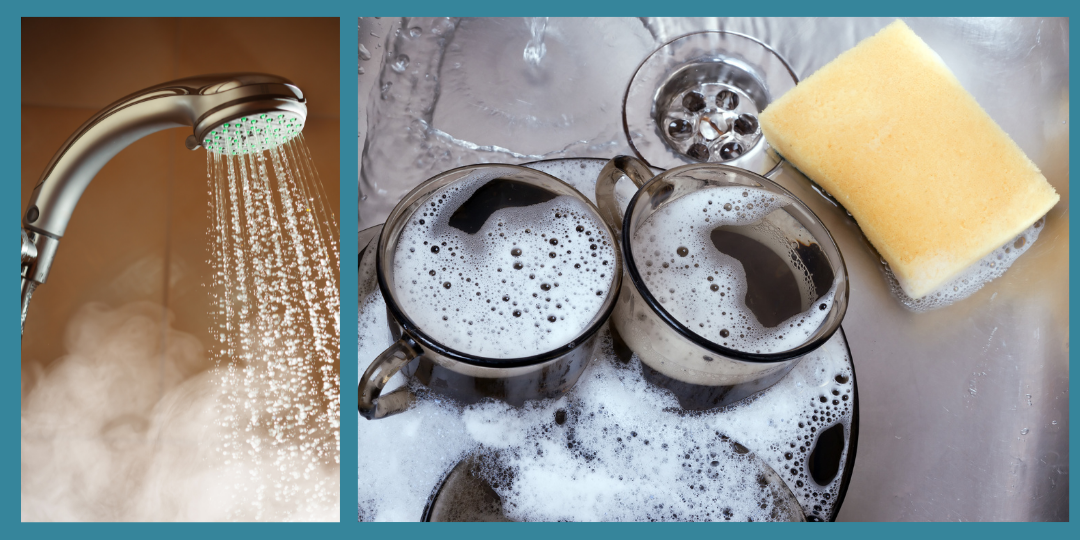
The Easiest and Cheapest Way to Reduce Household Greenhouse Gas Emissions
With our ever-changing climate, it is becoming imperative that we all assess our personal and household levels of energy consumption and greenhouse gas (GHG) emissions. When gas space and water heating equipment reach end-of-life, this is the perfect time to reduce your household carbon footprint.
Second, only to space heating, water heating uses the most energy in the home. Currently, water heating accounts for approximately 22.9% (1) of total household energy usage in British Columbia (BC). Although over 98% of the province’s electricity is produced through low-carbon, hydroelectric generation, 66.1% (2) of residential homes in BC still heat their water with gas, rather than electricity. With gas hot water heating typically emitting over 1 tonne of GHG emissions per home annually, gas-fueled water heating is a significant contributor to climate change.
Thankfully, the process of switching from gas tank or tankless type water heating systems to electric water heating systems is one of the easiest, most practical and most cost-effective upgrades a homeowner can do to reduce their household GHG emissions.

Say What? Hot Water Heating with Electricity can be Cheaper than with Gas
There is a perception among homeowners and within industry that heating water with gas will always be cheaper than electricity. Although current gas rates are 60% lower than electricity, this does not tell us the whole story.
Operational Costs:
By comparing an average operational cost of heating water with electricity, regular gas or 100% renewable natural gas – regular gas might appear cheaper:
- Gas water heating (tank): $341 per year
- Gas water heating (tank) system with 100% renewable natural gas: $516
- Electric water heating (tank) system: $499
But by looking at the purchase price, maintenance costs and the lifetime cost of heating with gas or electricity the picture looks different with electricity often beating out gas on cost and always beating out gas on being climate-friendly.
Purchase Price: Gas water heating systems are more expensive to purchase. In BC, new gas- fired water (tank) systems have an average upfront cost of $1,700 and tankless systems are approximately $4,000. A standard electric tank of the same size carries an average upfront cost of $900. A ‘premium’ electric tank system, which is better insulated and built out of durable, longer-lasting, materials, has an average upfront cost of $1,300. In short, there are cheaper electric water heating options.
Maintenance Costs: Tankless gas systems cost more to maintain. Standard electric water tanks do not require the same level of annual servicing as their tankless gas counterparts. FortisBC recommends annual servicing for natural gas equipment by a licensed natural gas contractor, including gas water heating systems, to ensure they are operating safely and efficiently (3). Gas water heating systems are typically more expensive to maintain (see cost analysis below).
When comparing the all-in costs of purchasing, maintaining and operating a water heating system – an electric system is cheaper than a gas system. A ‘premium’ electric tank would have a comparable to lower cost over a 25-year period. Even with higher purchase price and before rebates a high-efficiency heat pump will be less cost than gas systems and much lower cost than gas systems using 100% renewable natural gas.
Comparing Costs
The tables below show the average cost comparisons between using gas or 100% renewable natural gas and electricity to heat different water tank styles. All electric options remain comparable or cheaper to operate over a 25-year period when accounting for equipment purchases, operating costs and maintenance costs. Longer-life electric systems (like premium electric water tanks) and super-efficient electric systems (like heat pump hot water systems) provide low carbon and cost-effective water heating.
|
|
|||||
|
|
|
|
|||
|
|
|
|
|
|
|
|
|
|
|
|
|
|
|
|
|
|
|
|
|
|
|
|
|
|
|
|
|
|
|||||
|
|
|
|
|||
|
|
|
|
|
|
|
|
|
|
|
|
|
|
|
|
|
|
|
|
|
Stack up the benefits of switching from gas to electric water heating
There are so many benefits to switching to electric hot water.
- Market Access and Ease of Installation: Standard electric hot water tank systems are readily available and there is ample supply, and installation capacity. In many situations, electric water heaters can easily substitute a gas system. While heat pump water heaters are more expensive, and there are currently fewer contractors available to install these systems, it is expected that the supply and availability of contractors will grow as demand for these super-efficient systems expands.
- More Energy Efficient: All types of electric water heating systems are more efficient than gas systems. In addition, electric heat pump water heaters use 50% less energy when compared to a standard electric tank system.
- GHG Emissions Reductions: On average, switching from gas to electric water heating will deliver approximately 1.04 tonnes of GHG emission reductions per home on an annual basis. Switching to electric hot water heating is the GHG reduction equivalent to the average family reducing their gas-powered vehicle driving by 30%. The annual GHG reductions may be significantly greater for homes heating water with gas that have above average hot water consumption.
- Favourable or Comparable Lifetime Costs: Due to the a combination of lower purchasing costs, or lower maintenance costs, or longer-life and high efficiency, the lifetime costs of heating water with electricity will be comparable to lower than a gas system.
- Home Resilience: Homes with a tank-style water heating system will be more resilient in the event of an earthquake or other natural disaster. Using a typical tank-style water heater can provide between 30 and 80 gallons of emergency water for washing and flushing the toilet and other purposes during a disaster. Note appropriate precautions should be taken when accessing emergency water from a water heater.
- Electric Beats out Renewable Natural Gas for Cost-Effective Low Carbon Water Heating: Although renewable natural gas (RNG) is being proposed as a low GHG alternative to electrification, analysis shows that gas water heating with 100% RNG would be the most expensive water heating system option. Additionally, even if a home is paying for RNG, they are technically receiving the same regular gas as their neighbour because they share the same piping infrastructure. RNG is added at the system-level, which makes paying for RNG more of an offset – so the homeowner can not really take pride in living in a low carbon home.
So heating water with electricity is clearly much better – what now?
Since most water heating systems upgrades are done at the point of failure, a significant and sustained effort should be made to build awareness, provide education, and offer incentives to encourage homeowners and industry to plan ahead to switch their gas water heating systems to electric systems before, or at, end-of-life.
By using electricity to heat water, the future of bathing and dish washing will be low carbon and, likely, much more enjoyable. Think about low carbon hot water in all homes, children laughing and splashing around in bubble baths, whistling a snappy tune while you wash your hands (again), and couples singing and winking at each other while washing dishes together.
This could be our future – but it isn’t guaranteed. A sustained effort and investment is needed to build awareness about the climate impacts of heating water with gas and the many benefits of heating water with low-carbon, climate-friendly, electricity.
(1) Appendix C – Energy Use by End Use and by Energy Source resources, 2018
(2) Appendix C – Energy Use by End Use and by Energy Source resources, 2018
(3) https://www.fortisbc.com/safety-outages/natural-gas-safety/appliance-ma…
Author: City Green Solutions
Feb 2022

 b2e@zeic.ca
b2e@zeic.ca


